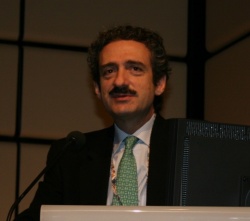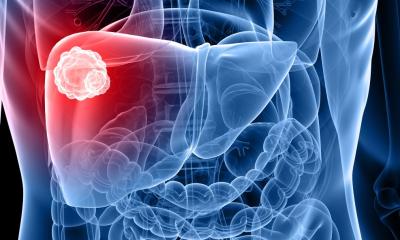Managing patients with hepatocellular carcinoma
ECR session illustrates need for multi-disciplinary decisions
The hepatocellular carcinoma is the sixth most frequent cause of cancer worldwide, explained Dr Bruno Sangro at ECR, and it is the third most frequent cause of death due to cancer.

The condition is far more frequent in Eastern than in Western countries, according to the Head of the Liver Unit, Clinica Universidad de Navarra in Spain; in Europe, more cases will be found in the Southern regions. Three major causes lead to liver tumours: hepatitis C infection, hepatitis B infection, and alcohol. In addition, the metabolic syndrome comprising obesity, diabetes, and hypertension is playing an increasingly important role. Cirrhosis developing due to these factors is the most important risk. “Liver tumours do not kill because of metastases; they kill because of progression within the liver and resulting dysfunction”, said Dr Sangro. Treatment is carried out locally.
Patients exposed to these risk factors should be screened, added the expert, speaking at a panel which included interventional radiologist Prof. José Ignacio Bilbao, President of ECR 2013 and Head of the Radiology Department, Universidad de Navarra, and abdominal radiologist Dr Alberto Benito from the same hospital.
In screening these patients, tumours will be detected in early stages by ultrasound. Other patients may be diagnosed with carcinomas – often large in size – due to liver insufficiency or other symptoms.
Multi-disciplinary approach is essential
“Treatment options should be discussed in a multi-disciplinary team”, urged the hepatologist. For patients with small tumours at an early stage, curative therapies should be considered. This includes ablation, e.g. of the whole liver when transplanted, taking a part of the liver – resection, or by destroying the tumour chemically, or through heat, using percutaneous ablation. Patients will be cured, or their condition may progress and relapse, and result in more aggressive tumour growth.
Treatment options include transarterial chemo-immunization or radio-embolization. “Both can be used, in slightly different portions, in different patients”, explained the expert. Patients who do not respond to local therapy because the tumour has invaded the vessels are given Sorafenib which has been shown to improve survival. Currently, “we are trying to learn in prospective, well designed and well conducted clinical trials how that systemic agent can be used in combination with resection, ablation, or local regional therapies to further promote survival of patients.”
Dr Bruno Sangro, hepatologist: “When we discussed recommendations […] in the Spanish association for the study of liver disease, one of the first things we agreed on was that patients with a hepatocellular carcinoma should be diagnosed and treated in a tertiary centres with multi-disciplinary teams. The opinions of surgeons, the interventional and abdominal radiologists, the hepatologist, the medical oncologist, and the pathologist should be taken into consideration. – Guidelines may provide frameworks, but decisions related to the individual case should be taken in agreement of these perspectives in a multi-disciplinary team.”
09.03.2013





